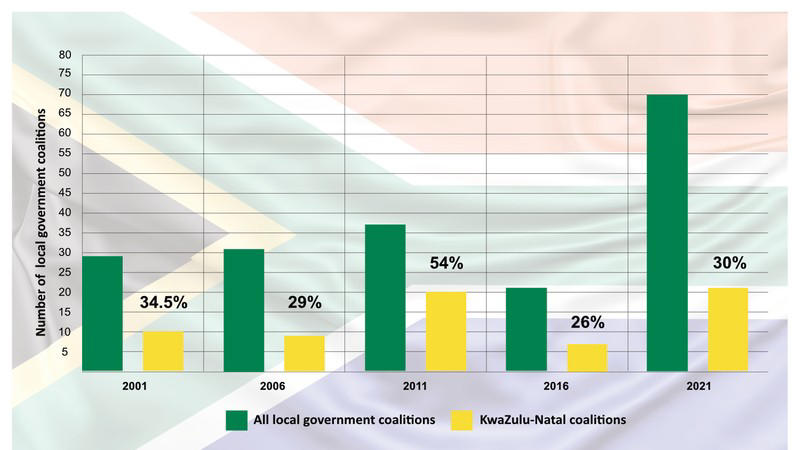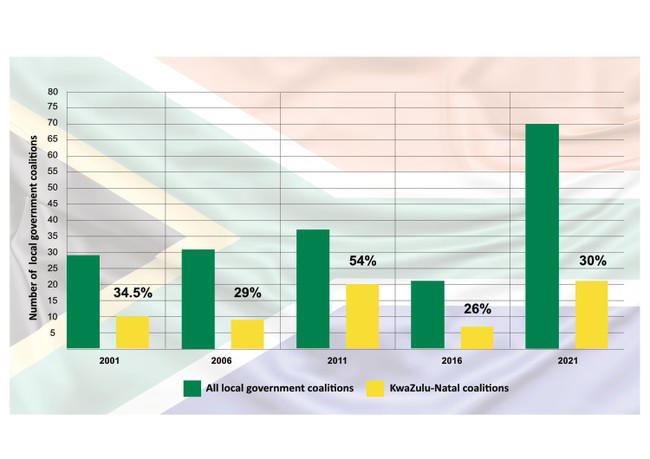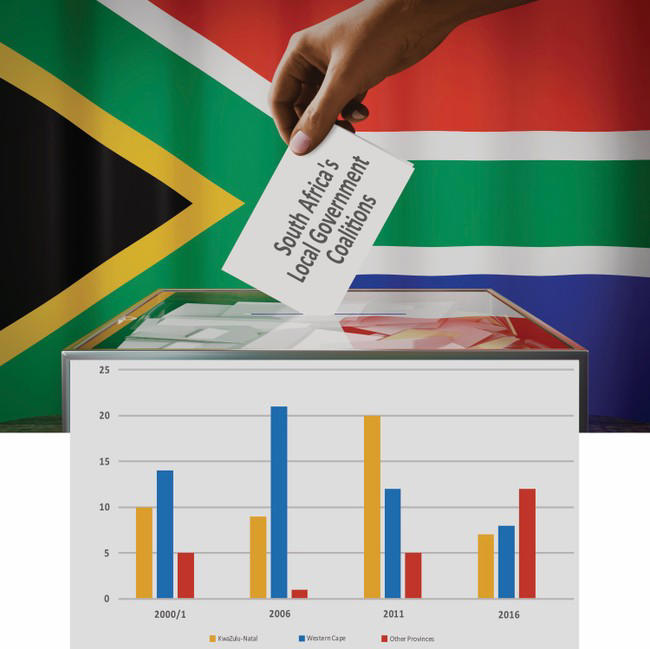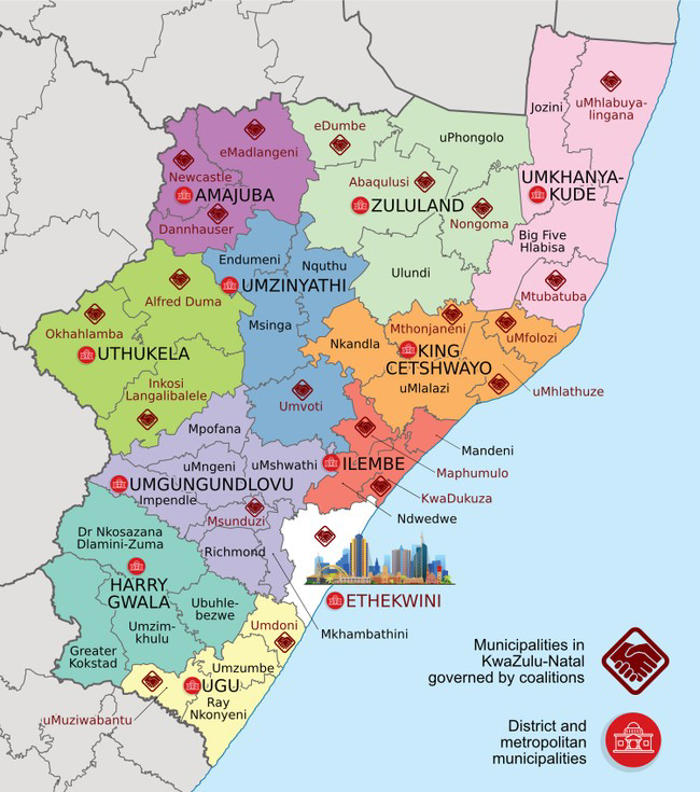‘Coalitions are not a new phenomenon in KwaZulu-Natal’

‘Coalitions are not a new phenomenon in KwaZulu-Natal’
By Nkanyiso Simelane and Boikanyo Nkwatle
As political parties prepare to go into coalition in the province of KwaZulu-Natal (KZN), we take a step back into the history of coalitions in KZN since 1994. In as much as there is currently massive hysteria – coalitions in the province are not a new phenomenon.
In fact, the very first form of government in the country’s democratic dispensation was a type of coalition government referred to as a Government of National Unity (GNU) in 1994.
The GNU included the African National Congress (ANC), National Party (NP) and Inkatha Freedom Party (IFP). Under normal circumstances, a coalition government is formed when no political party contesting elections obtains an outright majority of the votes to govern.
However, even though the ANC received an overwhelming majority of 62.65 percent of the electoral votes, the interim Constitution entitled parties holding at least 20 seats in the National Assembly to at least one Cabinet portfolio.
This GNU was used as a conflict-mitigating tool to ensure that there was no resurgence in political conflict and fostered peaceful nation-building. Beukes states, “Before South Africa transitioned to a democracy, the country experienced conflict and violence stemming from apartheid which caused deep divisions among contending race groups.” Thus, the GNU prevented and mitigated potential conflict post 1994.
The GNU illustrates the positive potential of coalitions as tools that can contribute to political stability for several reasons. Firstly, it was a power-sharing arrangement meant to oversee the process and finalisation of the new Constitution, as per the agreement of the CODESA negotiations.
Secondly, it promoted and maintained amicable relations between key political actors, in particular, the ANC, IFP and the NP, who were and could have continued to be in conflict. Thirdly, it served as a type of conflict-mitigation mechanism to deal with political violence nationally and particularly in the KZN province.
Provincial Government Coalitions in KZN
The GNU was also applied provincially in KZN in 1994 between the IFP and ANC. Historically, the ANC and the IFP had many years of political contestation and hostility towards each other, resulting in political violence since the mid-1980s.
In view of this history, the parties entered what can be termed a Government of Provincial Unity (GPU) in 1994, led by the IFP, but including ANC representatives in executive positions.
In this election, the IFP obtained 50.61 percent of the provincial vote and 41 of 81 seats in the provincial legislature, while the ANC received 32 percent and 26 seats. This GPU between the two parties created opportunities to mitigate historical conflicts and political violence in the province in the democratic dispensation.
After the 1999 general elections, the ANC and IFP entered into a grand coalition, as no party had obtained an outright majority. It is noteworthy that the 1996 final Constitution had come into effect and did not provide for a GNU. The IFP received 41.90 percent of the vote (34 of 80 seats), and the ANC received 39.38 percent of the vote (32 of 80 seats). Despite the history of violent political conflict between the two parties, this coalition is said to have been politically stable for the entire five-year term.
The provincial coalition government was headed by IFP’s Lionel Mtshali as premier, with Members of the Executive Council (MECs) from the ANC and IFP. The grand coalition was characterised by great political stability from its inception in 1999 up to 2004, including due to the fact that none of the premiers were voted out of power before the conclusion of their term. Ultimately, the KZN coalitions contributed to political stability, tolerance, and de-escalating the political violence that characterised the 1990s.
The 2004 general elections represented a crucial test for the political stability of KZN and the IFP-ANC grand coalition government. For the first time, the ANC obtained the majority with 46.98 percent of the provincial vote and 38 seats in the KZN provincial legislature, while the IFP obtained 36.83 percent and 30 of the 80 seats available.
Despite the changing political power dynamics, the ANC-led provincial government featured two IFP members. This coalition arrangement assisted in ushering in a peaceful transition in KZN’s leadership from the IFP to the ANC and maintained political stability in the province.
Local Government Coalitions in KZN
The 2021 local government election resulted in a total of 70 hung local municipalities and the formation of 70 coalition governments. Of the 70 municipalities, 21 are located in KZN, which means that 30 percent of local government coalitions were in KZN, the largest contributor across all provinces. KZN has a total of 44 local municipalities, which means that 47 percent of the local municipalities are governed by a coalition (21 of 44).

Figure 1: Share of local government coalitions, in South Africa, held by KZN
KZN is a key constituency when analysing coalitions in the country – contrary, for instance, to the dominant focus on Gauteng coalitions. In fact, KZN (along with the Western Cape province) has consistently accounted for most coalitions at local government level from 2000–2016, as shown in the figure below.

Figure 2: Local government coalitions in KZN, the Western Cape and other provinces. Picture: pablographix
Local coalitions existed in 29 councils in 2000/1; 31 councils in 2006; 37 in 2011; and 27 in 2016. It is noteworthy that of the 29 local municipal coalitions in 2000/1, 10 were in KZN (and 14 in the Western Cape), as the political landscape in these provinces was highly contested. In 2006, there were nine coalitions in KZN out of a total of 31 nationally; in 2011, KZN had 19 out of 37 nationally; and in 2016, there were seven coalitions in KZN out of 27 nationally.

Figure 3: Map of municipalities in KZN governed by coalitions after the 2021 elections. Picture:
It is noteworthy that the majority of these municipalities have had very limited changes in the mayors and speakers. This is particularly the case in smaller municipalities where there are fewer parties in the council and fewer coalition partners forming government.
Lessons from KZN Coalitions
A key lesson from the KZN context is that all municipalities in the province use the executive mayoral committee system as opposed to the executive mayoral system. The key difference between the two systems is that in the executive mayoral system, the mayor appoints the mayoral committee, and the entire mayoral committee is dissolved when the mayor is voted out of office.
However, in the executive mayoral committee system, the municipal council elects the mayoral committee, and it remains even when the mayor leaves. The KZN provincial legislature outlawed the use of the executive mayoral system, and all the local councils in the province use the executive mayoral committee system.
This arguably accounts for the relative political stability in KZN’s local coalitions governments as most coalition councils have had no changes in the mayor and speaker since the 2021 local elections. Other provinces wherein the executive mayoral system is used can follow this example for greater stability in local government coalitions.
Another lesson from KZN’s history of provincial coalitions indicates considerable political stability when there are fewer parties involved in a coalition government. One can further argue that a grand coalition produces greater stability, even in cases where the two largest parties are fierce rivals, as was the case for the ANC-IFP provincial coalition.
Furthermore, we learn from the ANC-IFP provincial coalition that it is important that the party with the most votes leads the coalition and heads the government, for instance. This brings about the most legitimate representation of the will of the voters.
Views that paint coalitions in South Africa as unstable are motivated by the political instability that results from the inability of parties to resolve conflicts effectively.
Disputes between coalition partners are left unresolved, which leads to the breakdown in coalition governments and the frequent change in mayors, speakers and mayoral committees. There is a need for comprehensive conflict resolution capabilities that can prevent and mitigate conflicts that impact governance.
When we consider the province’s history of political violence and the contemporary resurgence in politically motivated assassinations of local officials, conflict resolution becomes even more critical.
As the journey towards more coalitions continues, there would be a need for a regulated process, which may include several options, such as officially registering a coalition with an election management body or political party regulatory body and/or submitting legally-binding agreement documents prior to elections – as is the case in Kenya.
This article is an edited excerpt from a Policy & Practice Brief titled ‘A Historical Overview of Coalition Governments in the Province of KwaZulu-Natal’, published by the African Centre for the Constructive Resolution of Disputes (ACCORD) on June 10, 2024, accessible here.
Nkanyiso Simelane is a Researcher within ACCORD’s Research Unit, focusing on coalition governments in Africa – [email protected]
Boikanyo Nkwatle is a Research Intern within ACCORD’s Research Unit, focusing on coalition governments in Africa – [email protected]
Views expressed in this publication are the responsibility of the authors and not of ACCORD
